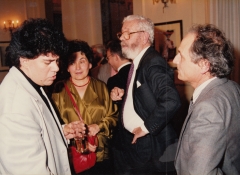Pedro Almodóvar

BERLANGA AND SUPPORTING ACTORS
All the actors were supporting actors with Berlanga; his films, even the ones with a clear leading role, were ensemble films. If I think of Cassen in “Plácido” or Sazatornil in “La escopeta Nacional” I still find their marvellous presence like that of supporting characters, who are able to draw with them a whole universe, but have too many people around them snatching bits of prominence off them. Life is an ensemble of things and so are the best of Berlanga’s films.
In the years when he was working, Berlanga was lucky enough to meet the best generations of the so-called “supporting actors” and they, in turn, were lucky to meet Berlanga, in whose films he took them to the highest level of popularity and excellence.
One should never think of the term “supporting” as something really secondary, and even less minor or pejorative
Thelma Ritter never starred in a film and the film fans will always remember her in each of the films she had a role in. María Luisa Ponte, Julia Caba Alba and Laly Soldevilla multiplied the quality and strength of the sequences they took part in although they rarely starred in them. All right, Laly, true, in “Vivan los novios” by Berlanga and “Duerme, duerme mi amor” by Paco Regueiro, if I’m not mistaken. I’m writing without much thought, so I’m bound to forget some important names and titles.
Berlanga’s films have not only marked the Golden age of Spanish cinema, but they have taken to the top the humble, everyday characters who fought against the precariousness and sordidness of their time, and the upper classes who were a mere, though craftier, reflection of the former. All his characters, the rich and the poor, were brothers, like Luis Ciges and José Luis Lopez Vazquez in the saga of “La escopeta nacional”. And to interpret them, he could count on with brilliant actors who have left a deep impression, written on the scrollers of the final credit titles. Names of big interpreters written in small print.
Chus Lampreave, Manolo Morán, Isbert himself, the meat and voice of a supporting actor, had his name in the lead credits, when he was already very old. Elvira Quintillá, Julia Caba Alba, Agustín González, Manuel Alexandre, Luis Ciges and so many others.
Even Sacristán, Landa and López Vázquez were supporting actors with Berlanga before each one of them became stars, and very deservingly, too.
I love everything about Luis García Berlanga. Everything I can identify with and everything that makes us different. I don’t want to compare myself to him, of course not, but I feel very close to his sense of humour, his fondness for Arniches and the “sainete” (a comedy sketch) in general, for the family as a dramatic nucleus, for the ensemble of supporting actors who are sometimes more important than the leading roles. Loneliness as an ever present topic (“Tamaño natural”). His fondness for the neighbourhood, the rural look of our towns but also of our cities and the characters that fill them; The tenderness of the rogues, the humanity and survival instinct as essential elements of the characters, regardless of who they are and the social class they belong to. The independence and the moral freedom that ruled his life and which I try to make pervade in my life. But we are very different directors, not only because of his geniality and knowledge. I think we both approach a shooting and the end of a cinematographic process in almost opposite ways. This is something that also fascinates me about him.
For example, I hate voice-overs. The darkness of dubbing rooms makes me feel anxious, and I am a great defender of the visceral interpretation, that which comes out immediately after hearing the words “Run! Action!”. I don’t believe in voice-overs unless it is to patch up a scene with a doubtful result or as a way to censor something. However, there are great directors for whom voice-overs were essential, Fellini and Berlanga himself, for example.
I also believe a tight script is the keystone on which films are built. For Luis the script was nothing short of the weapon with which a fascist producer could show a director no mercy.
His phobia towards live sound was well known, something logical because he finished his films in the dubbing studio. He rewrote his films, he improved them and gave them their final shape. That explains his phobia towards very elaborate scripts, they took away his freedom to shoot, edit and dub. His work system was really the most rational one. One knows the story he wants to tell when he’s finished shooting. The script should be written at that specific moment. Unfortunately, it cannot be done like that, but he never stopped trying, and he achieved it, or he almost did.
All the dubbing and rewriting after the shooting were his way of conceiving, developing and looking for perfection in each one of the scenes he shot. Some people say the search for perfection is nothing but a form of sadism, if there are other people besides the “perfectionist” himself taking part in the work, and in a film there can be at least as many as one hundred people.
Berlanga was a tireless perfectionist. Alfredo Landa defined him as “a son of a bitch with windows overlooking the street”. Berlanga loved this definition and he felt it was very accurate. I can imagine him endlessly repeating one of those sequence shots in which a galaxy of wonderful actors and actresses came in and out. Actors and actresses who didn’t all manage to be wonderful at the same time, in the same take, and sometimes hated the best director they had ever had. Luis García Berlanga, the forever unsatisfied, the very pleasant fetishist, the friend of his children’s friends, the undeniable father of the Spanish comedy (caustic, critical, tender) of all times.
Pedro Almodóvar, 2012






